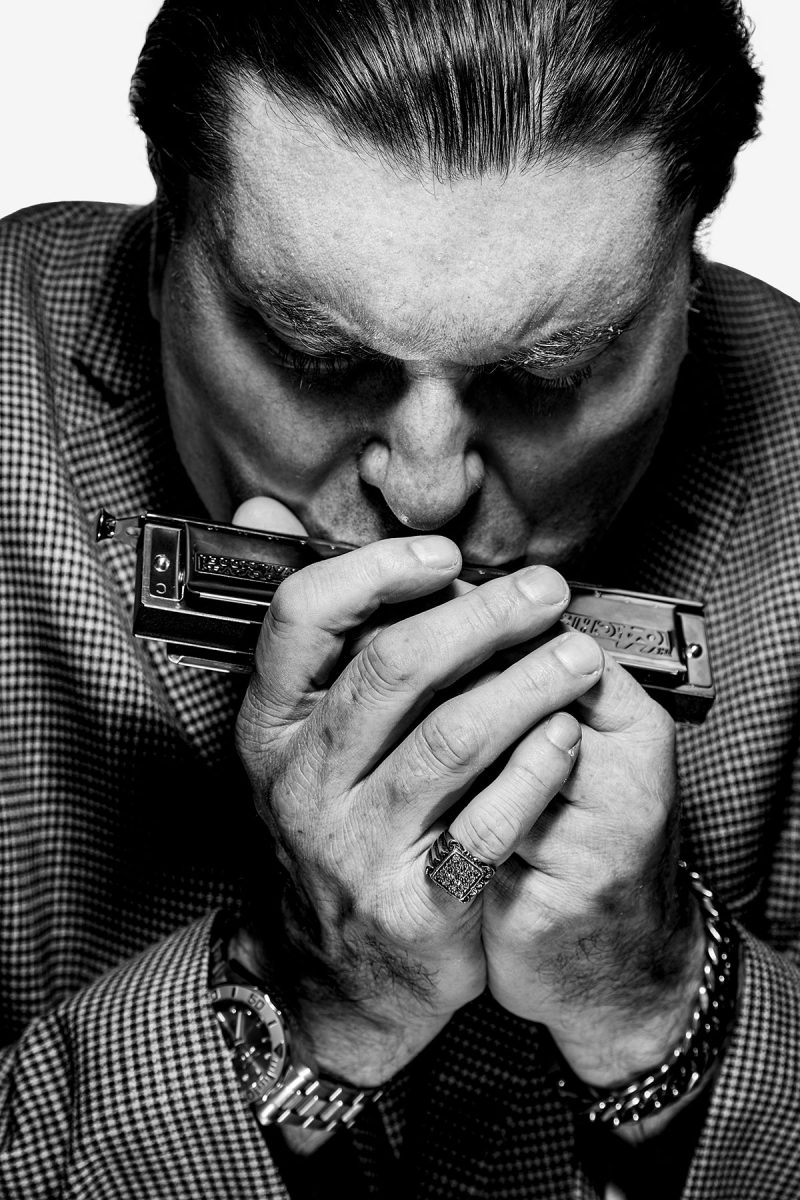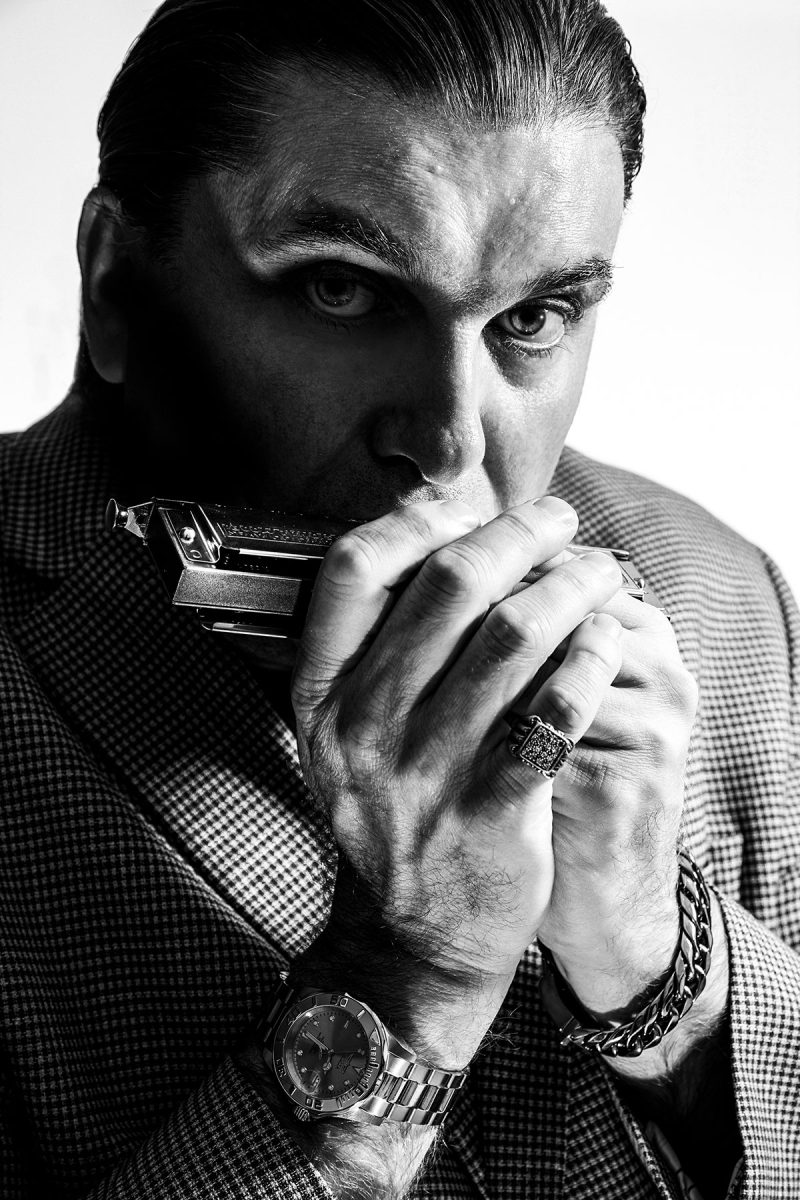Giles Robson on the blues, and their reflection of ‘us’.
Giles Robson is a multi-award-winning, internationally recognised blues harmonica virtuoso, singer, and showman. He has been described as “a blues giant, absolute master of the form” by Alligator Records and is the only UK or European artist to appear on this legendary blues record label. He is widely considered one of the greatest living blues harmonica players, and his albums feature in the critic polls of the world’s most prestigious music magazines. I asked Giles about the inspiration behind his craft, as well as the many twists and turns that have led him to where he is now.
If it were not for an unforgettable school trip to Toledo, Giles Robson may not have become the “blues giant” he is internationally recognised as being. At the age of 14, Giles already had experience playing both the violin and saxophone. He left the former in pursuit of the latter after discovering a passion for ‘Big Band Jazz’. However, this newfound love could not hold his attention, and he abandoned horn riffs and swings in search of the raw intimacy of the blues.


For Giles, it was love at first sight in the streets of Spain. Swept up in the whirlwind of it all, he brought home a harmonica, and began a musical love affair that characterised the rest of his life. In an uncanny twist of fate – or destiny – the week he returned to Jersey was the week Cephas & Wiggins, an African American blues duo, played at the Arts Centre. Reminiscing on this turn of events, Giles recalls that “seeing the real thing live so early set me on my course”. And what a course it was – the harmonica player ended up on the same record label as this inspiring duo 24 years later.
Since then Giles has become an internationally recognised blues player, and has been accredited with being “one of the finest blues harmonica virtuosos in the world”. He tours over fifteen countries a year and works with some of the most legendary figures in the blues music scene. He won the Blues Music Award in Memphis for best acoustic album, which then became the Living Blues album of the decade. He sold out 10 nights on the Edinburgh Fringe, and has been supported by the likes of Sir Mick Jagger, Billy Branch, Joe Louis Walker, John Primer and Sugar Blue. Commenting on these partnerships, Giles expressed that when he “hits the stage with one of these musical legends, and we achieve a strong musical connection that overcomes age, race and social differences, we create musical magic for the audience. This makes me feel profoundly blessed and grateful”.
It is the performance aspect of the blues that has ensured its survival in the modern day music scene. Whilst most other genres are consumed via track recordings, the blues are a testament to true, ‘living’ music. The community aspect of the genre is its defining one, and whilst other styles use live events as advertising for their records, Giles remarks that “the business with the blues was always live concerts, with the records being advertisements for the shows”. For the avid consumer of blues, streaming a track offers only a layer of the music – soaking in a live performance is what provides the full shebang. The genre’s fixed structure makes it instantly recognisable to any listener, a familiarity that allows Giles the pleasure of “building up an incredible amount of audience sympathy and trust almost immediately”.
“They know where each song is going, and as such they become entranced throughout an entire show. That’s pretty miraculous, and keeps people coming back for more. It is the repeating custom at concerts that keeps the genre alive and well.”
Memphis Slim, an inspiration of Giles Robson’s, said that “if you take one step towards an audience, they will take two steps towards you”. It is a mantra that rings true to Giles’ experience, where he has facilitated intimate audience conversations all across the globe. It’s what he tries to do in all his shows, to “really engage and have a relationship with the audience”. Whether its in a bar in Moscow or a show in Mississippi, “the genre is equally understood across the world, even between places and people who couldn’t be more different”.
“We are living in divisive political times, and art and music are one of the great unifiers of people”.
This relational sentiment applies equally to the musicians on the stage, and Giles has commented on the powerful feeling of performing alongside other half, Robbin Kapsalis. Speaking of this intimacy between him and the beautiful alto singer, Giles expressed that “it’s always magical getting to work with Robbin as the deep connection we have translates really well into a powerful on stage call and response. This could only happen with the blues. Other types of music, with more fixed structures and less of an improvisational aspect, wouldn’t facilitate this kind of onstage magic.”
Despite accumulating a lifetimes worth of achievements, the blues are not done with Giles yet. When I asked him about his plans for the future, he revealed that he is currently concentrating on his upcoming shows “Up Close with the Blues”. These ticketed events are for audiences of only 35-50 people.
Commenting on his decision to play for smaller audiences, Giles disclosed “whilst most musicians want to make their living by playing to as many people as possible, I want to make my living playing to as few people as possible”.
For Giles, it is the intimacy of the blues that “creates wonderful atmospheric evenings”, and these smaller gatherings are his self-professed “sweet spot”. Those in Jersey can find him playing in venues such as Sumas Restaurant, The Porter’s Store and The Blue Note, as well as many other places across the island.
Memphis Slim nicknamed the blues ‘the truths’, a statement that reverberates down to the genre’s roots. It is why the blues has permeated into every aspect of the modern day; they are a testament to the hard realities of human existence. By celebrating and singing through both joy and suffering, the blues “look trouble straight in the eye, laugh, and then allow you to live and fight another day”. The age-old tunes accumulate in the soundtracks of our lives, providing catharsis in the face of heartbreak, adversity and grief. They are ultimately “a music of survival… based in real life experience”, and if the past can tell us anything, the genre is here to stay.
Giles appears at The Porters Store on 25th April and the Blues Festival at the Havre des Pas Lido on May 26th.

